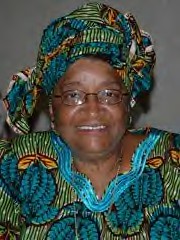
Ellen Johnson-Sirleaf, President of the Republic of Liberia. The west African nation has been a focal point in the international traffic of illegal diamonds.
Originally uploaded by Pan-African News Wire Photo File
LIBERIA'S TRUTH AND RECONCILIATION PANEL TO START PUBLIC HEARINGS
Liberia's Truth and Reconciliation Commission (TRC) announced Monday that it will this week start public hearings where those accused of atrocities in successive civil wars will confront their victims.
"The hearings are scheduled for tomorrow (Tuesday)," TRC spokesman Richmond Anderson told AFP. "President Ellen Sirleaf, diplomatic missions near our capital and other dignitaries will be at the opening programme."
The commission, created on similar lines to South Africa's
post-apartheid panel after a 2003 peace pact, began work in 2006 by touring the west African nation to gather evidence of rights violations committed between 1979 and 2003.
The aim is to shed light on massacres, summary executions, sexual violence and economic crimes within its scope perpetrated during Liberia's brutal conflicts, with a longer-term goal of national reconciliation.
The anticipated announcement of public hearings has roused mixed feelings in Liberia, where some in the capital felt they will be cathartic for the victims, but others fear stirring up the memories of the brutality and bloodshed.
"This will only aggravate the situation," preacher George Kpadeh told AFP. "It is like you are putting a knife in a sore that is finishing."
But lawyer Cerinus Cephus disagreed.
"Let justice be rendered to those who suffered the barbaric acts during the war," he said. "It is the best road towards true reconciliation."
On December 27, Anderson said that several hundred bodies had been found in mass graves in each of the six northern and eastern provinces where commission members have been able to go and explain their work.
"In every county where we went, people showed us at least one mass grave, resulting from massacres perpetrated during the war," Anderson told AFP on his return from a tour led by commission president Jerome Verdier.
People responsible for killings were undoubtedly among those team members met, but Anderson added: "Because we have given them the assurance that we are only there to find out the truth, they led us to areas where they buried the innocents."
Some of the worst atrocities of Liberia's wars took place in the heyday of warlord Charles Taylor in the 1990s, with his often youthful followers taking drugs and accused of brutality to the point of cannibalism.
After a partly US education, Taylor served in public office from 1979, went into exile in 1983 on being accused of embezzlement, was jailed in the United States, then escaped, fled to Ivory Coast and then underwent military training in Libya.
At Christmas 1989, he launched one of the most savage conflicts in Africa, though the then brutal president Samuel Doe was tortured to death the next year by another rebel force and Taylor became involved in an equally brutal civil and tribal conflict in neighbouring Sierra Leone.
He is currently on trial for war crimes and crimes against humanity before a special tribunal in The Hague, but this court deals with his alleged role in Sierra Leone, trading weapons for that country's "blood diamonds."
Between 1997 and 2003, Taylor managed to get himself Liberia's feared head of state, but the northern-based rebels of Liberians United for Reconcilation and Democracy (LURD) emerged in 1999, won regional and US backing, and that war ended after a three-month rebel siege of Monrovia.
In August 2003, Taylor bowed to pressure to go into exile and headed for Nigeria. He was finally arrested and transferred to The Hague in March 2006.
No comments:
Post a Comment